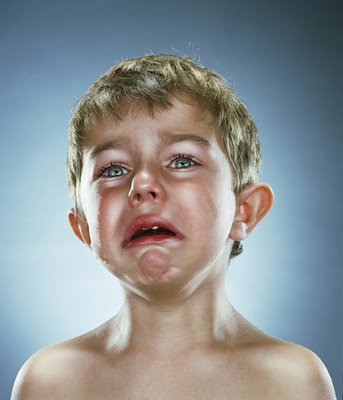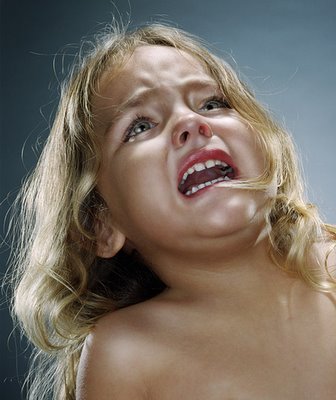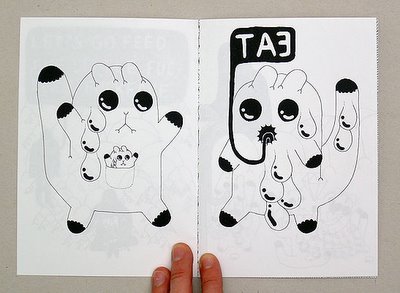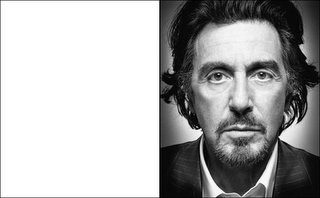5.4.07
29.3.07
16.3.07
15.3.07
Four Lengthy Metafilter Threads
.
How does one live a meaningful life in a world that one has come to believe is meaningless?
What do I need to do in daily life that I don't realize I need to be doing?
What are some modern ways in which to discover others' true character?
What does it feel like to get kicked in the balls?
.
Posted by
nico
0
comments
![]()
2.3.07
22.2.07
Why Women Aren't Funny
Be your gender what it may, you will certainly have heard the following from a female friend who is enumerating the charms of a new (male) squeeze: "He's really quite cute, and he's kind to my friends, and he knows all kinds of stuff, and he's so funny … " (If you yourself are a guy, and you know the man in question, you will often have said to yourself, "Funny? He wouldn't know a joke if it came served on a bed of lettuce with sauce béarnaise.") However, there is something that you absolutely never hear from a male friend who is hymning his latest (female) love interest: "She's a real honey, has a life of her own … [interlude for attributes that are none of your business] … and, man, does she ever make 'em laugh."
Now, why is this? Why is it the case?, I mean. Why are women, who have the whole male world at their mercy, not funny? Please do not pretend not to know what I am talking about.
[article]
Posted by
nico
2
comments
![]()
20.2.07
14.2.07
11.1.07
9.1.07
1.11.06
End Times
Photographer Jill Greenberg has whipped up a storm of controversy with her new exhibition, End Times. The pictures in the show, for which she deliberately provoked tearful outbursts from children by taking away lollipops she had just given them, have been described by some as tantamount to child abuse.
Greenberg herself insists that the children had the sweets returned within 30 seconds, that no lasting harm has been done, and that her concern was to depict what she says reminded her of the "helplessness and anger I feel about America's current political and social situation."
[link]
Posted by
nico
4
comments
![]()
21.10.06
Learned Opinion
From an article i was reading on the Black Death:
The Black Death
Learned Opinion
The cause of the disease was a matter of concern to many. Popular opinion did view the plague as a scourge from God, for the times were indeed out of joint. This was mere vulgar opinion, however, and the learned knew better than to believe it. But what, then, was the source of the plague?
The pope sent to Paris to obtain the opinions of the medical faculty there in 1348. They studied the problem for a time and returned a report. The good professors opined that the disaster was caused by a particularly unfortunate conjunction of Saturn, Jupiter and Mars in the sign of Aquarius that had occurred in 1345. This conjunction cause hot, moist conditions, which cause the earth to exhale poisonous vapors.
The report went on to recommend steps to keep safe from the disease. This, in part, was their prescription:
No poultry should be eaten, no waterfowl, no pig, no old beef, altogether no fat meat. . . . It is injurious to sleep during the daytime. . . . Fish should not be eaten, too much exercise may be injurious . . . and nothing should be cooked in rainwater. Olive oil with food is deadly. . . . Bathing is dangerous. . . .
In time, other writings appeared from the pens of educated men on the best ways to avoid the plague. From Italy came this advice:
In the first instance, no man should think of death. . . . Nothing should distress him, but all his thoughts should be directed to pleasing, agreeable and delicious things. . . . Beautiful landscapes, fine gardens should be visited, particularly when aromatic plants are flowering. . . . Listening to beautiful, melodious songs is wholesome. . . . The contemplating of gold and silver and other precious stones is comforting to the heart.
And then there is the Plague doctor, to me a strangely archetypal image
Posted by
Anonymous
4
comments
![]()
20.10.06
Victorian Post-Mortem Photography
Photographs of a deceased loved one served as substitutes and reminders of the loss. Families who could not afford to commission painted portraits could arrange for a photograph to be taken cheaply and quickly after a death. This was especially important where no photograph already existed. The invention of the Carte de Visite, which enabled multiple prints to be made from a single negative, meant that images could be sent to distant relatives. The deceased was commonly represented as though they were peacefully sleeping rather than dead, although at other times the body was posed to look alive.
Posted by
nico
3
comments
![]()
19.10.06
Papa Song's
Posted by
nico
4
comments
![]()
17.10.06
People like Kortbroek

Source
Marthinus Van Schalkwyk is well known as the last leader of the National Party, before it imploded, pathetically, into the ANC. Below follows a short biography of the man who betrayed his colleagues, his constituents, the Afrikaner people and democracy in
In 1990, Van Schalkwyk was doing all he could to tie himself to De Klerk – then leader of the NP and President of South Africa, and by 1997 he had management to wiggle his way to the top of the shitpile. “Kortbroek” – as was his nickname amongst hardliners because of his sycophantic subservience - was chosen as leader of the NP for the 1999 general elections. At this time the National Party (or to be precise, the NNP at that stage) had the stated goal of being meaningful opposition to the ANC Leviathan.
There was a popular urge for such a situation, and the NP was more successful than expected. And on an even more positive note, it had formed an alliance with the Democratic Party in 2000, which effectively gave them control over the
More than a million ordinary South Africans had put their trust in Marthinus to do as he promised. The people tasked him, gave him the mandate, to try keep the corruption inherent in one-party systems at bay. Yet in 2001 Marthinus had his National Party break off from the
This was the ANC’s grandest moment. How they must have chuckled.
The only opposition they faced was effectively destroyed. The NP officially disbanded in April 2005, as Marthinus went from stating in 2003 that the ANC was "failing the poor" and had abandoned "principles like unity, equality and patriotism that have nothing to do with skin color", to bleating at the official disbandment of the NP that he “would personally encourage other NP leaders and members to join the ANC”. He effectively told his constituents, half a million people, to go to hell. He made the country less democratic, less just. He made our society just a little more cynical, and for that the name of Marthinus van Schalkwyk should go down as a stain on this country’s history. May his children shame him thusly.
Posted by
Anonymous
0
comments
![]()
13.10.06
Another Short Story
Guts by Chuck Palahniuk
If you're in the least bit squemish, dont read this.
Posted by
nico
6
comments
![]()
11.10.06
Portraits of the stars
From a fascinating interview with star photographer Platon on what he's learned from his subjects.
When Platon's exuberance got the better of him and he asked if Al Pacino could recreate the late scene from The Godfather II where he's in the garden...Pacino leaned forward, touched him on the knee, and went, shhhhhh. Then he took on Michael Corleone for about 30 seconds. "I'm the only person to photograph Pacino as Michael Corleone," Platon says proudly.
On Keanu Reeves: "I'm not sure if this guy's really shy or really dim." He incessantly asked Platon, "What's my motivation?"
"No sex please, we're British," is apparently a well-known bit of Brit self-deprecation that Platon felt related to the following story about shooting Monica Bellucci, who he describes as one of the three sexiest women alive. He was in the dressing room talking with her before the shoot and mid-conversation she drops her towel and asks her gorgeous Italian assistants to rub baby oil "all over her curves" so she could slide into the skin-tight dress she'd chosen. "She knew exactly what she was doing," Platon insists. At the end of the shoot he asked to have a photo shot with her for his scrapbook, and, getting a little cheeky and no doubt intoxicated by her closeness he warned her, "I'm a married man." She whispered in his ear ("I can still feel her warm breath on my neck"), "Don't worry darling, I'm married too."
Benicio Del Toro: "No one touches the hair."
Platon on Matt Damon, who is "really nice, but a little square": "I had to help him look cooler than he really was."
On Christopher Walken, in the understatement of the night: "Now this guy is weird." Walken showed up for a shoot at Platon's house an hour early (unprecedented), alone (un-heard-of), and wearing black elastic pants pulled up to his armpits (what do you expect). He walked through the studio, straight into Platon's kitchen and started going through the cabinets. Platon, a little confused, asked him if he was hungry, and could he get him something to eat? "No," Walken replied, and kept opening cabinet doors. His advice on life? "It helps if you drink." The only way he would let Platon shoot his portrait? "You're going to say 'Chris' and I'm going to look at you and then I'm going to look away." "We did that for two hours," Platon says.
Posted by
nico
3
comments
![]()
10.10.06
What's the best novel in the past 25 years?
England's Guardian newspaper asked 150 literary luminaries to vote for the best British, Irish or Commonwealth novel from 1980 to 2005. These are the results:
First place:
Disgrace (1999) - JM Coetzee
Second place:
Money (1984) - Martin Amis
Joint third place:
Earthly Powers (1980) - Anthony Burgess
& Atonement (2001) - Ian McEwan
The full list can be found here.
Posted by
nico
5
comments
![]()





































